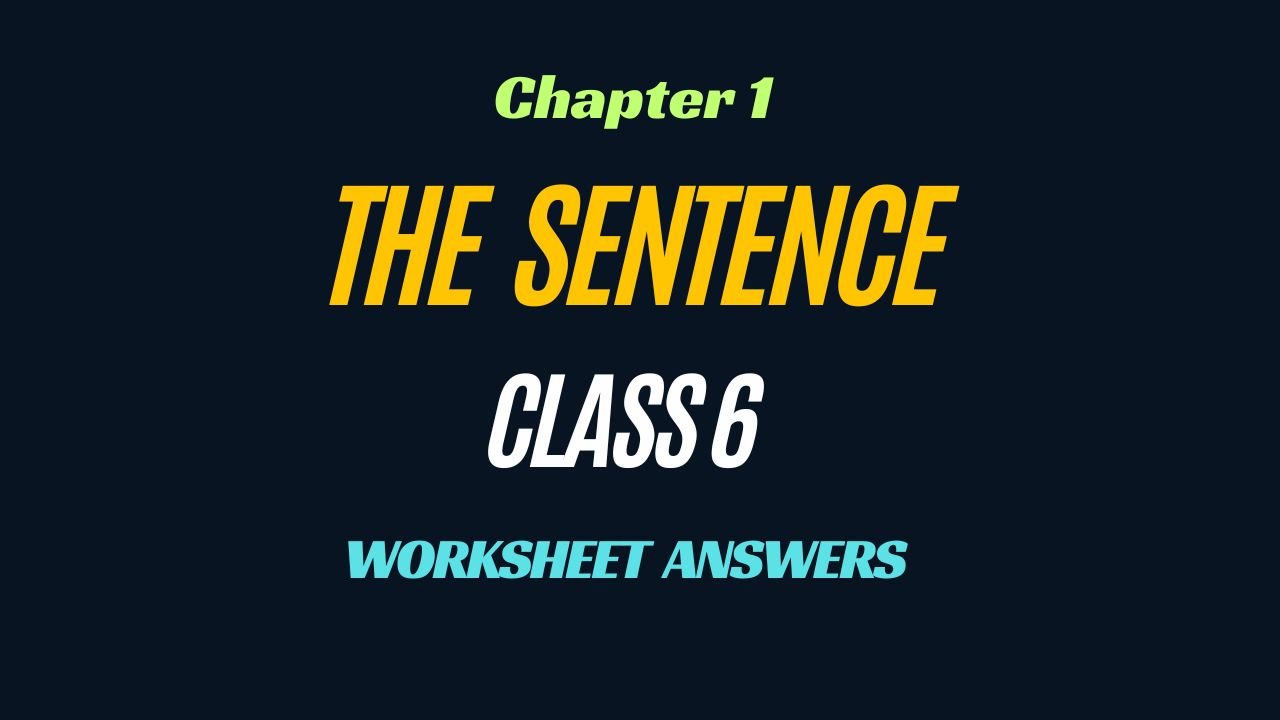Explore complete answers to the Class 6 Sentence Worksheet for Chapter 1, suitable for CBSE, ICSE, and NCERT students. These answers help you understand sentences and their types better. They are made to help students learn grammar easily at the Class 6 level.
Kinds of Sentences
Sentences can be divided into four kinds-
- declarative sentences
- imperative sentences
- interrogative sentences
- exclamatory sentences
1. declarative sentences
A declarative sentence states facts.
For example,
- It is going to rain today.
- You should go to the library sometimes.
Declarative sentences end with a full stop.
Declarative sentences are of two kinds-affirmative and negative.
- Madhuri sings well. (affirmative)
- Madhuri does not sing well. (negative)
Negative sentences have no, not, none, never, etc., in them.
English Grammar Ebook for Class 6
2. Interrogative sentences
Interrogative sentences ask questions.
For example,
- Did you brush your teeth?
- Where did you keep the cake?
Interrogative sentences end with a question mark.
Note: Interrogative sentences are also used in requests and offers. For example,
- Will you please help me?
Interrogative sentences are of four kinds―yes/no questions, wh questions, tag questions, and choice questions.
A. Yes/No questions are questions that can be answered with a yes or a no response.
For example,
- Did you do your homework?
- Are you ready to go to school?
Note: The answer to a wh question can be a simple response or an elaborate explanation.
B. Wh questions are questions that begin with wh-words, such as who, why, when, where, and which,
- Who is your class teacher?
- Which is your favourite colour?
C. Tag questions are questions that are formed by adding an interrogative tag at the end of a declarative or an imperative statement.
For example,
- Mrs Lal is your class teacher, isn’t she?
- You are a good student, aren’t you?
- Maya doesn’t speak French fluently, does she?
- You can’t drive a car, can you?
- She likes to travel, doesn’t she?
Note: Affirmative statements have a negative tag and negative statements have an affirmative tag.
D. Choice questions are questions that provide a choice. The answer to the choice question is in the question itself.
For example,
- Would you prefer chocolate or vanilla ice cream?
- Do you like the black dress or the blue one?
3. Imperative sentences
Imperative sentences express a command, a request, or a piece of advice.
For example,
- Stop fighting. (command)
- Please keep your eyes open. (request)
- Always speak the truth. (advice)
Note: In most imperative sentences, the subject you is implied, it is not mentioned.
4. Exclamatory sentences
Exclamatory sentences express sudden emotions and feelings.
For example,
- What pleasant weather it is!
- This is fabulous!
Exclamatory sentences end with an exclamation mark.
Note: Short commands also end with exclamation marks as they express both an order and a strong emotion.
For example,
- Stop it!
- Halt!
Transformation of Sentences
Sentences can be transformed from one kind to the other. For example,
◼He came to meet me. (declarative)
✔ Did he come to meet me? (interrogative)
◼ She is coming to meet me. (declarative)
✔Is she coming to meet me? (interrogative)
◼ She sings well. (declarative)
✔Does she sing well? (interrogative)
◼ She has completed the work. (declarative)
✔Has she completed the work? (interrogative)
◼Ravi can swim. (declarative)
✔Can Ravi swim? (interrogative)
◼How kind of you to help me! (exclamatory) (meaning hasn’t changed)
✔It was kind of you to help me. (declarative) (meaning hasn’t changed)
◼Rajesh failed in his attempt. (positive)
✔Rajesh did not succeed in his attempt. (negative)
Class 6 English Grammar Chapter-Wise Contents:
3: Nouns
5: Gender
6: Case
7: Pronouns
8: Verbs
10: Adjectives
12: Adverbs
13: The Simple Tense
17: Prepositions
18: Conjunctions
19: Articles
22: Direct and Indirect Speech
The Sentence Class 6 Worksheet
Discover comprehensive answers to The Sentence Class 6 Worksheet, Chapter 1, invaluable guidance for class 6 students of CBSE, ICSE, and NCERT, facilitating a deeper comprehension of grammatical concepts at the Class 6 level.
The Sentence Class 6 Worksheet 1
A. Identify the kinds of sentences. Mark D for declarative sentences, I for interrogative sentences, IM for imperative sentences, and E for exclamatory sentences.
1. How many students can form a society?
2. The news came as a complete surprise.
3. When did they come to a decision?
4. How late the train is!
5. What a nice fellow he is!
6. Can you play the piano?
7. Wool comes from sheep.
8. Did it rain last night?
9. Take up the challenge.
10. Maria is leaving for Morocco tomorrow.
11. Pay attention.
12. Many roads are still blocked.
The Sentence Class 6 Worksheet 2
B. Get into groups of four. Then, each of you can use these phrases to make the four kinds of sentences-declarative, interrogative, imperative, and exclamatory.
| your feet | visit grandparents | play football |
| this film | learn Sanskrit | go for picnic |
| my sister | Chinese food | ride a bike |
The Sentence Class 6 Worksheet 3
C. Identify these interrogative sentences. Mark Y for yes/no questions, T for tag questions, C for choice questions, and W for wh questions.
1. When do you play football?
2. He doesn’t like the rainy season, does he?
3. When did they come to visit you?
4. Has the bus already left?
5. You have lost weight, haven’t you?
6. Where do you live?
7. Should I call you or send you a message?
8. You live in a city, don’t you?
9. Did you clean up your room?
10. Are you moving to Brazil?
The Sentence Class 6 Worksheet 4
D. Complete these sentences with appropriate tag questions.
1. You will be coming to the party, ………………………….
2. Priya likes to draw pictures, ………………………….
3. Peter and Ben are studying English, ………………………….
4. Himanshu won’t be late, ………………………….
5. Chitra can skate well, ………………………….
6. Lathika doesn’t like milk, ………………………….
7. This film is boring, ………………………….
8. You don’t know Meera, ………………………….
9. Raju can speak English well, ………………………….
10. We go to school by bus, ………………………….
The Sentence Class 6 Worksheet 5
D. Change the sentences as instructed.
1. Ratan is arriving at 9:00 a.m. (Change to interrogative.)
2. Rajan is always on time. (Change to negative.)
3. How kind of her to help the injured puppy! (Change to declarative.)
4. They are in the swimming pool. (Change to interrogative.)
5. Shadan is in the bedroom. (Change to interrogative.)
6. Are the children tired? (Change to declarative.)
7. Do cheetahs run fast? (Change to exclamatory.)
8. Can you pick me up at 10 o’clock? (Change to declarative.)
9. Does his mother bake delicious cakes? (Change to declarative.)
10. How awful the weather is! (Change to declarative.)
The Sentence Class 6 Worksheet 6
E. Unjumble each set of words and form a sentence. Then, identify its kind.
1. a beautiful is painting what this.
……………………………………… kind:………………………..
2. jar broke the who
……………………………………… kind:………………………..
3, tonight to am concert going I the
……………………………………… kind:………………………..
4. once the at door
……………………………………… kind:………………………..
5. she well sings how
……………………………………… kind:………………………..
6. your what name is
……………………………………… kind:………………………..
The Sentence Class 6 Worksheet 7
F. Make the jumbled words unjumbled and make sentences.
1. wrote/last/week/a/I/poem.
2. her/the/weekend/visited/I/grandmother.
3. he/took/yesterday/the/exam/important.
4. purchased/new/I/guitar/a/yesterday.
5. baked/she/cookies/this/morning.
6. completed/project/I/just/the.
7. cleaned/room/yesterday/my/I.
8. read/I/book/an/interesting/yesterday.
9. cooked/dinner/she/last/night.
10. received/he/award/prestigious/a/today.







